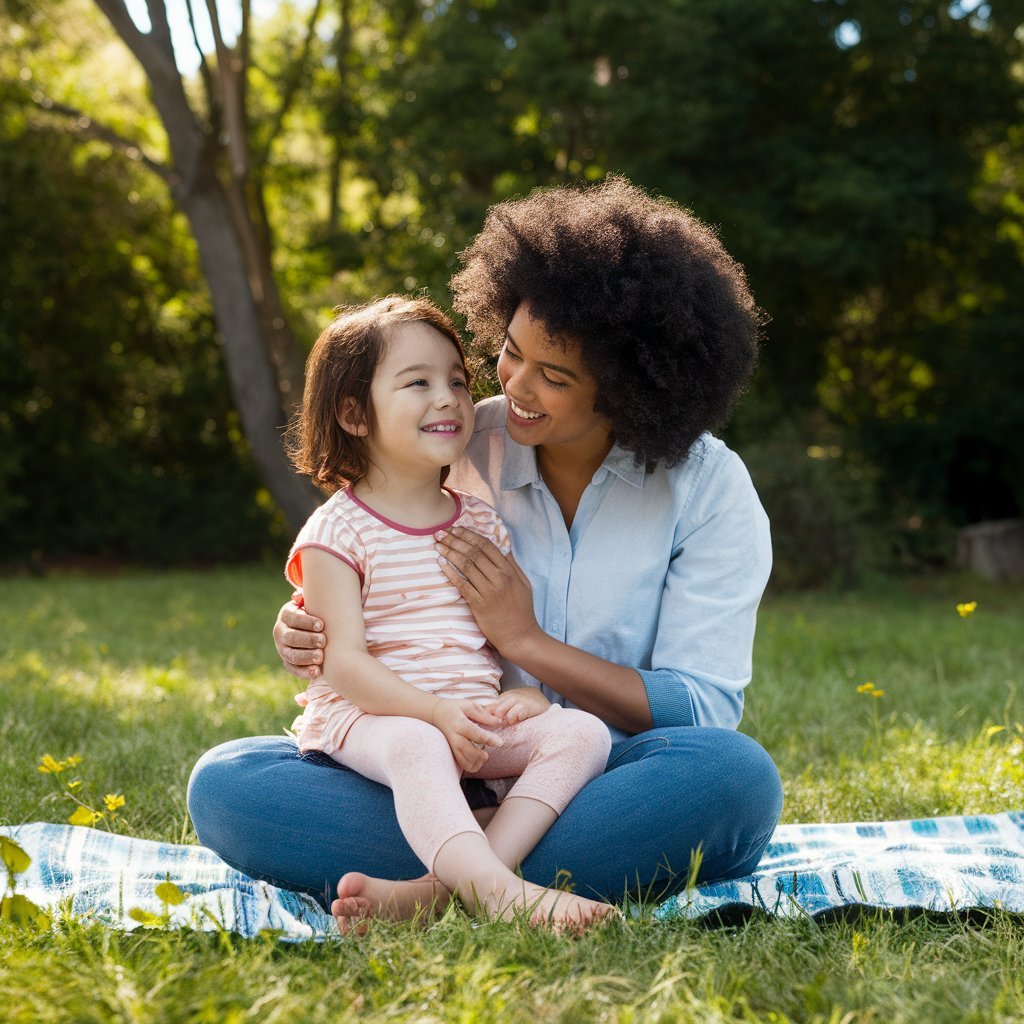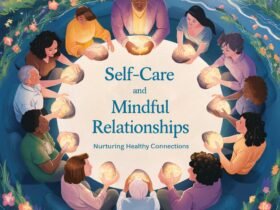Self-Care and Mindful Parenting: Nurturing Yourself and Your Children
Hey there, my dear friends of 2024! It’s your favorite self-care explorer, Nita Sharda, here to take you on a beautiful journey into the world of self-care and mindful parenting. Now, I know what you might be thinking – “Parenting? Isn’t that something only grown-ups do?” But trust me, even if you’re not a parent yourself, understanding how to nurture and care for others is a valuable skill that can help you throughout your life!
Today, we’re going to put on our explorer hats and discover what self-care and mindful parenting are all about, and how they can help you create a loving, supportive environment for yourself and those around you. But before we dive in, let me make one thing clear – this is not about putting pressure on you or making you feel like you have to be perfect. It’s simply about empowering you with the knowledge and tools to approach parenting (and life!) with kindness, compassion, and mindfulness.
So, are you ready to join me on this self-care and mindful parenting adventure? Let’s go!
What is Self-Care?
First things first, let’s talk about what self-care actually is. Self-care is the practice of taking care of ourselves – physically, mentally, emotionally, and spiritually. It’s about doing things that make us feel good, help us recharge, and support our overall wellbeing.
Self-care can look different for everyone, but some common examples include:
- Getting enough sleep and rest
- Eating nutritious foods that fuel our bodies
- Exercising and moving our bodies in ways that feel good
- Taking breaks and doing things we enjoy, like reading, playing, or creating art
- Practicing relaxation techniques like deep breathing or meditation
- Expressing our feelings and needs in healthy ways
- Setting boundaries and saying no when we need to
The key to self-care is listening to our bodies and minds, and doing what feels right for us in the moment. It’s not about being selfish or indulgent, but rather about taking responsibility for our own wellbeing so that we can show up as our best selves in all areas of our lives.
Why is Self-Care Important for Mindful Parenting?
So, why is self-care so important, especially when it comes to mindful parenting? Here are a few key reasons:
It Helps Us Be More Present and Patient
One of the key benefits of self-care is that it helps us be more present and patient with our children (and ourselves!). When we’re feeling stressed, overwhelmed, or burnt out, it can be hard to show up as the kind of parent we want to be – one who is calm, attentive, and responsive to our children’s needs.
By practicing self-care regularly and making sure our own cups are full, we’re better equipped to handle the challenges of parenting with grace and patience. This means taking breaks when we need them, asking for help when we’re struggling, and prioritizing our own wellbeing so that we can be fully present and engaged with our children.
It Models Healthy Habits and Boundaries
Self-care is also important for modeling healthy habits and boundaries to our children. When we prioritize our own needs and take care of ourselves in loving, compassionate ways, we’re teaching our children that it’s okay (and necessary!) to do the same.
This means setting clear boundaries around our time and energy, saying no to things that don’t serve us, and making space for activities and practices that bring us joy and fulfillment. By modeling self-care in our own lives, we’re helping our children develop the skills and habits they need to take care of themselves throughout their lives.
It Helps Us Respond to Our Children with Empathy and Understanding
Finally, self-care is important for helping us respond to our children with empathy and understanding, even in challenging moments. When we’re feeling depleted or reactive, it can be easy to lash out or shut down when our children are struggling or pushing our buttons.
By practicing self-care regularly and cultivating a sense of inner calm and resilience, we’re better equipped to respond to our children with kindness and compassion, even when things get tough. This means taking a deep breath before reacting, seeking to understand our children’s perspectives and needs, and responding in ways that promote connection and understanding.
What is Mindful Parenting?
Now that we’ve talked about self-care, let’s explore the concept of mindful parenting. Mindful parenting is the practice of bringing awareness, presence, and compassion to our interactions with our children, with the goal of creating a nurturing, supportive environment that promotes growth and wellbeing.
Mindful parenting involves several key principles, including:
- Being fully present and attentive to our children in the moment, without distractions or judgment
- Responding to our children’s needs and emotions with empathy and understanding, even when it’s challenging
- Setting clear, consistent boundaries and expectations in a loving, respectful way
- Encouraging our children’s autonomy and independence, while providing support and guidance as needed
- Cultivating a sense of joy, playfulness, and wonder in our interactions with our children
- Practicing self-compassion and forgiveness when we make mistakes or struggle as parents
Mindful parenting is important because it helps us create a strong, loving bond with our children that supports their healthy development and emotional wellbeing. When we approach parenting with mindfulness and compassion, we’re better equipped to navigate the ups and downs of family life with resilience and grace.
Why is Mindful Parenting Important?
So, why is mindful parenting so important, especially in today’s fast-paced, ever-changing world? Here are a few key reasons:
It Promotes Secure Attachment and Emotional Intelligence
One of the key benefits of mindful parenting is that it promotes secure attachment and emotional intelligence in our children. When we’re fully present and attuned to our children’s needs and emotions, we’re helping them develop a strong sense of safety, trust, and connection that lays the foundation for healthy relationships throughout their lives.
This means responding to our children’s cues and communication with sensitivity and warmth, providing comfort and reassurance when they’re distressed, and helping them name and express their feelings in healthy ways. By nurturing our children’s emotional intelligence through mindful parenting, we’re setting them up for success in all areas of their lives.
It Fosters Resilience and Self-Regulation
Mindful parenting is also important for fostering resilience and self-regulation in our children. When we approach parenting with patience, consistency, and compassion, we’re helping our children develop the skills and strategies they need to navigate challenges and setbacks with flexibility and grit.
This means setting clear, age-appropriate boundaries and expectations, while also providing our children with the support and guidance they need to problem-solve and cope with difficult emotions. By modeling resilience and self-regulation in our own lives, and providing a safe, supportive environment for our children to practice these skills, we’re helping them develop the inner strength and resourcefulness they need to thrive in a complex world.
It Encourages Positive Communication and Connection
Finally, mindful parenting is important for encouraging positive communication and connection within our families. When we approach our interactions with our children with presence, empathy, and respect, we’re creating a family culture that values open, honest communication and mutual understanding.
This means taking the time to really listen to our children’s thoughts, feelings, and perspectives, even when they differ from our own. It means expressing our own needs and emotions in healthy, constructive ways, and working together as a family to find solutions and compromises that work for everyone. By prioritizing positive communication and connection through mindful parenting, we’re building strong, loving relationships that can weather any storm.
Nurturing Yourself and Your Children through Self-Care and Mindful Parenting
So, how can we bring self-care and mindful parenting together to nurture ourselves and our children in today’s world? Here are a few key strategies:
Make Self-Care a Priority
The first step in nurturing yourself and your children through self-care and mindful parenting is to make self-care a priority. This means carving out time and space in your daily life for activities and practices that support your physical, mental, and emotional wellbeing, even when it feels challenging or indulgent.
Some tips for making self-care a priority include:
- Setting realistic goals and expectations for yourself, and celebrating progress along the way
- Asking for help and support when you need it, whether from family, friends, or professionals
- Creating daily rituals and routines that incorporate self-care practices, like exercise, meditation, or creative pursuits
- Practicing self-compassion and forgiveness when you struggle or fall short of your own expectations
By making self-care a non-negotiable part of your life, you’re not only nurturing your own wellbeing, but also modeling healthy habits and boundaries for your children.













1 Comment